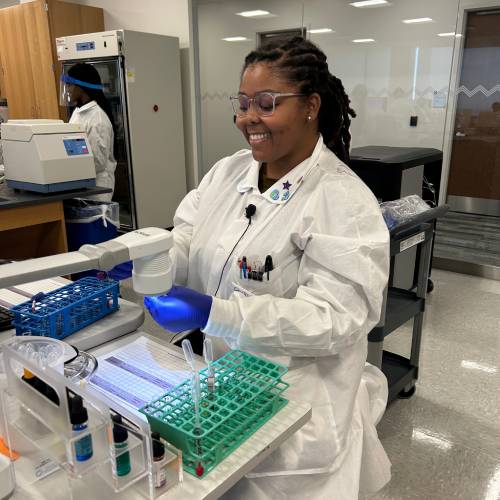Transfusion Services Summer Scholars aims to grow future lab professionals
 A new summer program aims to build the next generation of lab specialists by giving students a front-row seat to a critical and often overlooked area of health care: Transfusion medicine.
A new summer program aims to build the next generation of lab specialists by giving students a front-row seat to a critical and often overlooked area of health care: Transfusion medicine.
Hosted by the Department of Medical Laboratory Sciences, the Transfusion Services Summer Scholars program is a week-long, hands-on experience designed to introduce rising high school juniors up to rising college juniors to the world of blood banking and laboratory science. With generous support from the Commonwealth Transfusion Foundation, the July 14-18 program is fully funded for participants, including campus housing, meals and even a $500 stipend.
Transfusion medicine, also commonly referred to as blood banking, focuses on ensuring safe blood transfusions for patients. Laboratory specialists who work in blood banks determine blood types, detect unexpected antibodies and carefully match blood and blood products – including red blood cells, plasma and platelets – to patients in need. Whether it’s a cancer patient requiring platelets during chemotherapy, a car accident victim needing emergency transfusions or a child battling sickle cell disease, transfusion medicine specialists work behind the scenes to make life-saving care possible.
“We wanted to create a program that brings awareness to medical laboratory sciences and, specifically, to transfusion medicine,” said Melissa Jamerson, Ph.D., chair of the department, within VCU’s College of Health Professions. “Students often know they want a career in health care, but they don't always realize the critical role that lab professionals play.”
Summer Scholars will dive into ABO and Rh blood typing – the familiar A, B, O, positive and negative groupings – and tackle case studies that weave in other major disciplines like hematology and immunology. Guest speakers from VCU Health, the American Red Cross and program faculty and alumni will also share real-world insights. Students will even tour working laboratories to see these vital processes in action.
The need for awareness and new recruits is urgent. The discipline faces a national shortage, with more professionals currently retiring than entering the field. Meanwhile, advances in testing and increased patient needs have made laboratory services even more critical in making diagnoses and treatment decisions today.
“This is about more than just education. It’s about building the future workforce,” said Maiya Picott, M.S., laboratory instructor who is overseeing the scholars program. “We hope these students walk away with a real appreciation for the complexity and importance of providing blood products.”
In its first year, the program received more than 85 applications from across the country, including several from as far away as Texas for 12 student spots. That marked a highly competitive start for a program that organizers hope to expand in the future.
Beyond the summer program, the Commonwealth Transfusion Foundation is also helping to grow the next generation of lab scientists with significant scholarships. This year, that totaled nearly $340,000, including four full scholarships for junior and senior MLS students at VCU’s Abingdon campus and additional awards for 10 Richmond students.
The nonprofit foundation strives to ensure a safe and sustainable blood supply for Virginia, in part by its support of initiatives that improve health care outcomes for state residents.